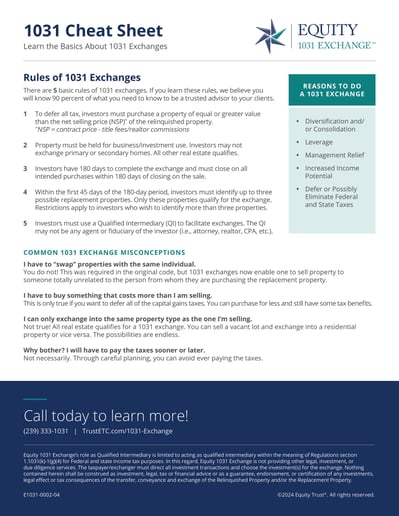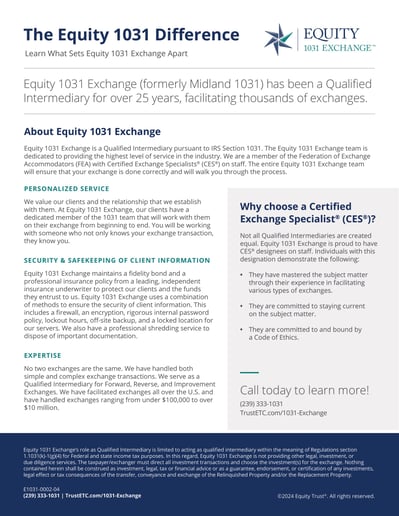1031 Exchange Resources for Title Agents
Help Your Clients Defer Taxes with 1031 Exchanges
Equity 1031 Exchange acts as a Qualified Intermediary (QI) to handle 1031 exchanges. To learn more, download our 1031 exchange guide for real estate professionals.
Prefer to speak with a specialist? Book a meeting at a time that's convenient for you.
Download the 1031 Exchange Guide for Real Estate Professionals
NAVIGATING 1031 EXCHANGES: YOUR ROLE AS TITLE AGENT
Coordinate closely with the Qualified Intermediary (QI) to ensure proper handling of funds.
Follow the instructions of the QI and prepare the documents pursuant to the QI’s instructions.
Direct clients to their QI promptly if there are any client concerns or questions to be addressed.
1031 EXCHANGE TIPS FOR SUCCESS
Here are considerations to keep in mind for a successful 1031 exchange:
 WATCH THE TIMELINE
WATCH THE TIMELINE
Adhering to IRS timelines is critical. Identify replacement properties within 45 days and complete the purchase within 180 days to avoid disqualification and immediate tax liabilities. These deadlines run concurrently with each other, and both begin on the day of closing.
 MAKE SURE IT’S AN INVESTMENT PROPERTY
MAKE SURE IT’S AN INVESTMENT PROPERTY
Only properties held for investment or business use qualify. Personal residences and properties held for resale do not qualify. Ensure the property meets IRS criteria to maintain tax-deferred status.
 CONTACT A QI BEFORE CLOSING
CONTACT A QI BEFORE CLOSING
A QI is required to facilitate the exchange by holding and using sale proceeds to purchase the replacement property. The seller must set up the QI before closing to avoid disqualification and capital gains tax.
 NET SELLING PRICE
NET SELLING PRICE
To defer capital gains tax fully, the net selling price of the relinquished property must be equal to or greater than the purchase price of the replacement property. Reinvest all sale proceeds to avoid taxable gains.
 ENSURE NO NON-ALLOWABLE EXCHANGE EXPENSES
ENSURE NO NON-ALLOWABLE EXCHANGE EXPENSES
Separate non-allowable expenses such as financing fees, property taxes, or repairs from exchange funds to maintain tax-deferred status. If there are non-allowable expenses, these will be liable for taxes.
![]() CORRECT CONTRACT LANGUAGE
CORRECT CONTRACT LANGUAGE
Include language in purchase and sale agreements that reflects the intent to perform a 1031 exchange. Insert a cooperation clause to ensure all parties agree to the exchange process. Incorrect or missing language can jeopardize the exchange.
 SAME TAXPAYER
SAME TAXPAYER
The taxpayer selling the relinquished property must be the same as the one buying the replacement property. Ensure the title on both properties is identical to avoid invalidation and taxes.
Who signs the closing documents?
The Exchanger would sign the documentation similar to a standard real estate transaction in which no exchange was involved. Equity 1031 Exchange would only sign the closing settlement statement as the QI for the Exchanger.
Your documentation references that the contract has been assigned to you as the QI. Am I to prepare a deed from the Exchanger to you, and another from you to the new buyer?
No, you will prepare the deed directly from the Exchanger to the buyer.
Where do we send the proceeds?
The proceeds are to be wired directly to the QI to hold in escrow on behalf of the Exchanger.
The Exchanger has advised that they want to take some funds at closing. Is this OK?
Those funds may be taxable to the Exchanger, but they are allowed to take some of the funds at closing. There would need to be a line item referencing the cash disbursed to the Exchanger. A separate line item will be for the 1031 proceeds going into the exchange.
The Exchanger has advised that they will be taking title of the new purchase in the name of an LLC, which is different from your documentation/instructions. What is the proper protocol?
You are holding more money than we need for closing. Can the excess be disbursed to the Exchanger at closing?
Equity 1031 Exchange will only send funds needed for closing. Any excess funds will be disbursed to the taxpayer by the QI at the appropriate time. Any funds returned to the client may be taxable, so it is important to apply for as many funds as possible. There are a couple of options:
-
If the Exchanger provided the earnest money deposit with personal funds, we could replace that amount with some or all of the overage.
-
If the Exchanger is obtaining financing on the new purchase, they should seek to reduce the loan amount. In doing so, all of the proceeds apply towards the purchase.
SHARE THESE HELPFUL RESOURCES WITH YOUR CLIENTS


